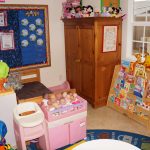Sharing with the Family Child Care Providers
Pat H
Typical Skills Children Learn in Family Day Care
Activity
Specific Skills Learned
Finding Toys or learning materials to work with by self or with others.
Cognitive: Makes decisions about interests and abilities. Self help: Finds toys by
himself or sets up environment for play. Social/Language: Learns to share, barter,
manage conflict, and ask for help. Emotional: Learns about acceptance and
rejection. Expresses needs.
Block play
Physical: Learns to balance blocks and line them up (small motor coordination).
Cognitive: May count blocks, sees pattern and design. Learns to build and plan
structure. Matches blocks that look alike. Social: Learns to share and cooperate.
Dramatic play
Social: Plays adult roles. Develops self-image and coordinates with others.
Language: Learns to express self in another role. Cognitive: Decides appropriate
dress and appearance for role; uses visual perceptions to assist self, others, and
play environment. Learns and remembers behaviors to imitate. Develops abstract
thinking abilities. Self-help: Dresses self. Sets up play environment and finds props.
Setting the table
Cognitive: Counts silverware, glasses and napkins, or places one object by each
setting. Follows pattern of place settings. Social: Cooperates with other children.
May teach younger children to help. Physical: Picks up and places objects (small
motor coordination).
Sitting down to eat
Physical: Pours milk, passes the dish (small motor coordination). Cognitive:
Measures to pour. Understands directions. Social/Language: Learns appropriate
table conversation and manners.
Story time or listening to music
Cognitive: Listens and retains information. Follows story line (sequencing) with
eyes and/or ears. Recognizes words, pictures, instruments, and rhythms.
Fingerplays or songs
Cognitive/Language: Learns words, gestures, and melody (sequencing, repetition,
speech and listening skills). Follows directions. Physical: Coordination (small and
large motor) for gestures and fingerplays.
Dance
Cognitive/Language: Listens to music and rhythms. Learns to understand simple
movement directions and their relationship to the music. Physical: Coordinates
movements (large motor).
Climbing/riding
Cognitive: May count the rungs to the top of a climbing structure; plans his climb.
Maps out direction and distance to ride: watches for others in path. Physical: Large
motor coordination, balance. Social: Takes turns, interacts.
Sand play
Cognitive: Measures sand and maps out roads (spacial relationships). Physical:
Pours, dumps, pushes, gathers, scoops, packs (small and large motor). Social:
Shares, interacts, cooperates.
Putting away toys
Cognitive: Sorts toys, follows directions. Physical: Places object on the shelf,
replaces lids, opens and shuts doors. Social: Takes turns, learns to handle toys
carefully.

